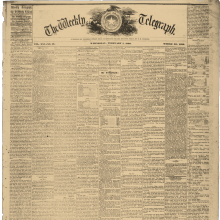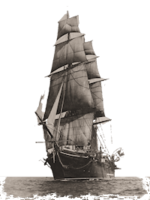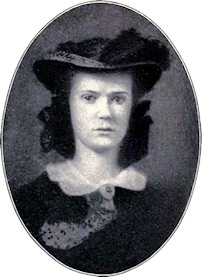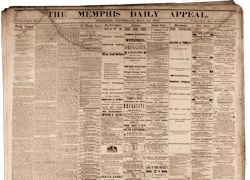April 13, 1863, Memphis Daily Appeal (Jackson, Mississippi)
From the Richmond Examiner.
The reader will find in the report of evidence in the police court, the true account of a so-called riot in the streets of Richmond. A handful of prostitutes, professional thieves, Irish and Yankee hags, gallows birds from all lands but our own, congregated in Richmond, with a woman huckster at their head, who buys veal at the toll-gate for a hundred and sells the same for two hundred and fifty in the morning market, undertook the other day to put into private practice the principles of the commissary department. Swearing that they would have goods “at government prices,” they broke open half a dozen shoe stores, hat stores, and tobacco houses, and robbed them of everything but bread, which was just the thing they wanted least. Under the demagogue’s delusion that they might be “poor people,” “starving people,” and the like, an institution of charity made a distribution of rice and flour to all who would ask for it. Considering the circumstances, it was a vile, cowardly and pernicious act; but the manner in which it was received exhibits the character of this mob. Miscreants were seen to dash the rice and flour into the muddy street, where the traces still remain, with the remark that “if that was what they were going to give, they might go to h-ll.” It is greatly to be regretted that this most villainous affair was not punished on the spot. Instead of shooting every wretch engaged at once, the authorities contented themselves with the ordinary arrest, and hence the appearance of the matter in the police report of the morning.
If it were the only thing of this sort which has appeared in Southern cities, it would not be worth attention. But as the reader has already seen from our columns, some two weeks ago there was one in Atlanta, immediately followed by one in Mobile; which was succeeded by another in Salisbury; then in Petersburg; and the very next day by this in Richmond. Now if these were unconcerted tumultuous movements, caused by popular suffering, they would not, could not, have this regular gradation of time from one city to another in the line of travel from the South to North. It is impossible to doubt that the concealed investigators in each case were the same. Having done the work in one city, they took the cars to the next. That they are emissaries of the Federal government it is equally difficult to doubt. For some time past the Northern press has teemed with intimations of some wonderful secret machinery which was at work to overthrow the South. This is what they meant. No doubt the next arrival of Northern newspapers will be filled with lies about these thief saturnalia, which will shame Munchausen. As three hundred Yankee prisoners went off by flag of truce on yesterday, the whole story, with all the additions which malice and invention can supply, has already got as far as Old Point.
No doubt either that they will be represented as “bread riots!” Bread riots! while this and every other city of the South has always had large appropriations for the poor uncalled for; when labor is so scarce that everything in human shape that is willing to work can make from two to four dollars in the day; when seamstresses refuse two dollars and a half, with board, because the said board does not include tea and butter! Plunder, theft, burglary, and robbery, were the motives of these gangs, foreigners and Yankees the organizers of them.
One thing is certain, that if any exhibition of the sort appear again, it must be put down in such a manner that it will never be repeated. There would never have been but one if the magistrates and citizens of the town in which they occurred had done their duty. A most contemptible notion, that such disturbance is a shame, which must be hidden, (as well try to hide the sun!) led them to coax and wheedle the audacious miscreants engaged in it. That course ensured their recurrence. It always does so. When an individual permits himself to be black-mailed by a scoundrel, he is always bled again and again till he is exhausted; so too a community which permits itself to be bullied by its criminal population, must expect to find it bolder every day until it rules all. We know that a street rabble, of which a cowardly king was afraid, once got such possession of Paris; that it produced an anarchy of blood and horror which lasted two years; lasted till the mob met a Corsican lieutenant who was not afraid of it or aught; when it vanished in a whiff of powder smoke and never was heard of again. Times of revolution and war are always fertile in this species of crime, and unless checked properly it becomes exceedingly dangerous to the public cause. There is only one way to check it properly. The opportunity to do so should not be avoided, or approached reluctantly, but eagerly sought and pursued to its very utmost extent of availability.
It is useless to dwell on this truth. For citizens who have arms in their hands and yet permit their money and property to be ravished from them by cowardly burglars and thieves, because they are incited to come in a gang of fifty in broad day light, instead of by twos or threes at midnight, we have no sympathy. If the officers of the law, with the ample decision and energy to do more than arrest highway robbers and disperse a mob of idlers at their heels, whose presence there deserved immediate death quite as well, no words or arguments can furnish them with the pluck they lack.










